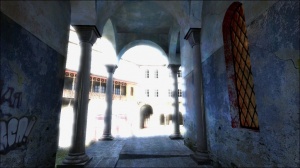HDR

High Dynamic Range (HDR) rendering simulates brightness above that which a computer monitor is capable of displaying, before downconverting to ![]() Standard Dynamic Range (SDR, internally referred to in Source and Source 2 as LDR, for Low Dynamic Range) video. This mainly involves "blooming" colors above 100% brightness into neighboring areas and adjusting a virtual camera aperture to compensate for any over-exposure that results.
Standard Dynamic Range (SDR, internally referred to in Source and Source 2 as LDR, for Low Dynamic Range) video. This mainly involves "blooming" colors above 100% brightness into neighboring areas and adjusting a virtual camera aperture to compensate for any over-exposure that results.
Besides the obvious effects of this (see right), HDR gives richer colors and finer gradients: since bright and dark areas are pushed into white and black, correctly exposed areas are drawn with a far wider range of values.
HDR rendering is available with Source 2006 and later, and requires a GPU that supports DirectX 9 or newer for Windows (or OpenGL 1.4 and later for macOS/Linux). However, some maps in certain games such as ![]() Counter-Strike: Source,
Counter-Strike: Source, ![]() Half-Life 2 (both at the time were running Source 2006) weren't fully compiled with HDR support until the engine update in 2010, upgrading it to
Half-Life 2 (both at the time were running Source 2006) weren't fully compiled with HDR support until the engine update in 2010, upgrading it to ![]() Source 2009 along with changes to the maps and skybox textures to support HDR.)
Source 2009 along with changes to the maps and skybox textures to support HDR.)
Since ![]() Left 4 Dead engine branch and later games (with some exceptions), HDR rendering is now required and LDR/SDR rendering has been deprecated, with the option to disable HDR removed.
Left 4 Dead engine branch and later games (with some exceptions), HDR rendering is now required and LDR/SDR rendering has been deprecated, with the option to disable HDR removed.
HDR in Source
![]() Source does not have a physically accurate HDR simulation. Its camera has a far wider range than the human eye (let alone real cameras), and it also adjusts to changes in brightness far faster. Both of these are expedient to gameplay of course, especially in multiplayer.
Source does not have a physically accurate HDR simulation. Its camera has a far wider range than the human eye (let alone real cameras), and it also adjusts to changes in brightness far faster. Both of these are expedient to gameplay of course, especially in multiplayer.
In fact, by default, Source does not even create "proper" HDR images. Instead, it collapses the image down to LDR early, like many other games in the 2000s/early 2010s, this is both hardware and software limitations at the time and proper HDR display output are only introduced later in mid-2010s with supported games, graphics card, displays, operating systems (Windows 10 and later), and newer HDMI/DisplayPort versions. The average user would be hard-pressed to tell the difference, however, and the benefits include support for all DX9+ GPUs, MSAA compatibility, and excellent performance.
Despite LDR was deprecated since ![]() Left 4 Dead, some games like
Left 4 Dead, some games like ![]() Portal 2 aswell as
Portal 2 aswell as ![]() Dota 2 (pre-Reborn) allows users to disable HDR through console commands, however:
Dota 2 (pre-Reborn) allows users to disable HDR through console commands, however:
- In Portal 2, while you can disable HDR using console command (
mat_hdr_level 0), all Portal 2 maps does not have LDR lighting compiled by default, which will cause "mat_fullbright" ('full bright' lighting) to be enabled. - In the original release of Dota 2, the game only uses LDR lighting, and none of the maps appear to have HDR lighting data. Additionally the game does not have an option to enable HDR aside from using console command.
